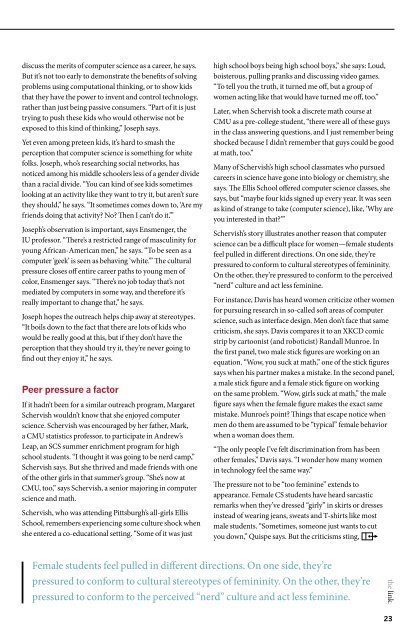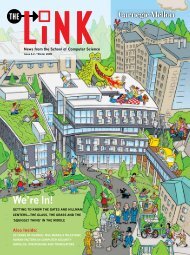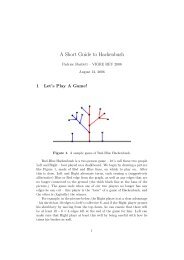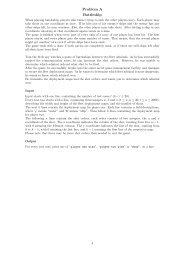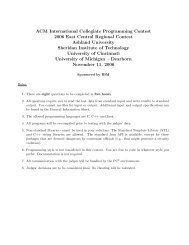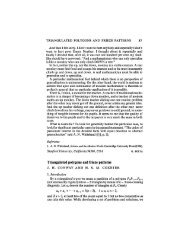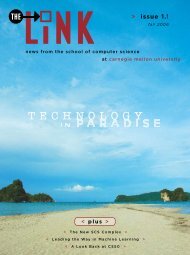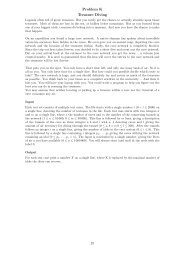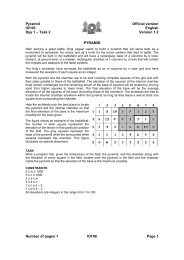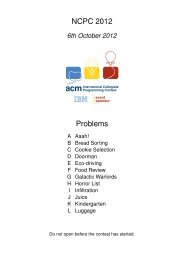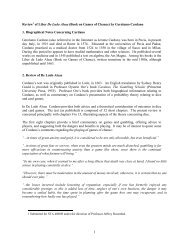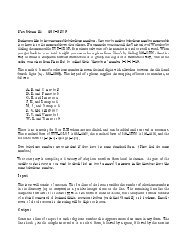Download now (1.3MB, PDF reader required) - Link home page
Download now (1.3MB, PDF reader required) - Link home page
Download now (1.3MB, PDF reader required) - Link home page
Create successful ePaper yourself
Turn your PDF publications into a flip-book with our unique Google optimized e-Paper software.
discuss the merits of computer science as a career, he says.<br />
But it’s not too early to demonstrate the benefits of solving<br />
problems using computational thinking, or to show kids<br />
that they have the power to invent and control technology,<br />
rather than just being passive consumers. “Part of it is just<br />
trying to push these kids who would otherwise not be<br />
exposed to this kind of thinking,” Joseph says.<br />
Yet even among preteen kids, it’s hard to smash the<br />
perception that computer science is something for white<br />
folks. Joseph, who’s researching social networks, has<br />
noticed among his middle schoolers less of a gender divide<br />
than a racial divide. “You can kind of see kids sometimes<br />
looking at an activity like they want to try it, but aren’t sure<br />
they should,” he says. “It sometimes comes down to, ‘Are my<br />
friends doing that activity No Then I can’t do it.’”<br />
Joseph’s observation is important, says Ensmenger, the<br />
IU professor. “There’s a restricted range of masculinity for<br />
young African-American men,” he says. “To be seen as a<br />
computer ‘geek’ is seen as behaving ‘white.’” The cultural<br />
pressure closes off entire career paths to young men of<br />
color, Ensmenger says. “There’s no job today that’s not<br />
mediated by computers in some way, and therefore it’s<br />
really important to change that,” he says.<br />
Joseph hopes the outreach helps chip away at stereotypes.<br />
“It boils down to the fact that there are lots of kids who<br />
would be really good at this, but if they don’t have the<br />
perception that they should try it, they’re never going to<br />
find out they enjoy it,” he says.<br />
peer pressure a factor<br />
If it hadn’t been for a similar outreach program, Margaret<br />
Schervish wouldn’t k<strong>now</strong> that she enjoyed computer<br />
science. Schervish was encouraged by her father, Mark,<br />
a CMU statistics professor, to participate in Andrew’s<br />
Leap, an SCS summer enrichment program for high<br />
school students. “I thought it was going to be nerd camp,”<br />
Schervish says. But she thrived and made friends with one<br />
of the other girls in that summer’s group. “She’s <strong>now</strong> at<br />
CMU, too,” says Schervish, a senior majoring in computer<br />
science and math.<br />
Schervish, who was attending Pittsburgh’s all-girls Ellis<br />
School, remembers experiencing some culture shock when<br />
she entered a co-educational setting. “Some of it was just<br />
high school boys being high school boys,” she says: Loud,<br />
boisterous, pulling pranks and discussing video games.<br />
“To tell you the truth, it turned me off, but a group of<br />
women acting like that would have turned me off, too.”<br />
Later, when Schervish took a discrete math course at<br />
CMU as a pre-college student, “there were all of these guys<br />
in the class answering questions, and I just remember being<br />
shocked because I didn’t remember that guys could be good<br />
at math, too.”<br />
Many of Schervish’s high school classmates who pursued<br />
careers in science have gone into biology or chemistry, she<br />
says. The Ellis School offered computer science classes, she<br />
says, but “maybe four kids signed up every year. It was seen<br />
as kind of strange to take (computer science), like, ‘Why are<br />
you interested in that’”<br />
Schervish’s story illustrates another reason that computer<br />
science can be a difficult place for women—female students<br />
feel pulled in different directions. On one side, they’re<br />
pressured to conform to cultural stereotypes of femininity.<br />
On the other, they’re pressured to conform to the perceived<br />
“nerd” culture and act less feminine.<br />
For instance, Davis has heard women criticize other women<br />
for pursuing research in so-called soft areas of computer<br />
science, such as interface design. Men don’t face that same<br />
criticism, she says. Davis compares it to an XKCD comic<br />
strip by cartoonist (and roboticist) Randall Munroe. In<br />
the first panel, two male stick figures are working on an<br />
equation. “Wow, you suck at math,” one of the stick figures<br />
says when his partner makes a mistake. In the second panel,<br />
a male stick figure and a female stick figure on working<br />
on the same problem. “Wow, girls suck at math,” the male<br />
figure says when the female figure makes the exact same<br />
mistake. Munroe’s point Things that escape notice when<br />
men do them are assumed to be “typical” female behavior<br />
when a woman does them.<br />
“The only people I’ve felt discrimination from has been<br />
other females,” Davis says. “I wonder how many women<br />
in technology feel the same way.”<br />
The pressure not to be “too feminine” extends to<br />
appearance. Female CS students have heard sarcastic<br />
remarks when they’ve dressed “girly” in skirts or dresses<br />
instead of wearing jeans, sweats and T-shirts like most<br />
male students. “Sometimes, someone just wants to cut<br />
you down,” Quispe says. But the criticisms sting,<br />
Female students feel pulled in different directions. On one side, they’re<br />
pressured to conform to cultural stereotypes of femininity. On the other, they’re<br />
pressured to conform to the perceived “nerd” culture and act less feminine.<br />
the link.<br />
23


